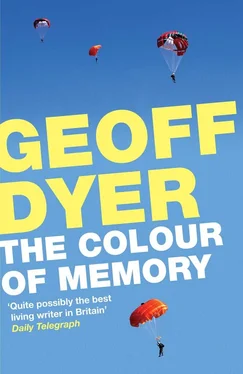I looked across at my friends, their eyes made soft and dark by the candles and fire.
Freddie and I sat in his kitchen drinking tea. The radio was on. Someone knocked on the door and when Freddie opened it a cold wedge of air rushed in. Foomie stood in the hall, stamping snow off her boots. She was wearing Steranko’s huge dark overcoat.
It was winter in the city.
Freddie filled up the kettle and I moved round the table to make room for Foomie. Her face was glowing from the cold. Snow was melting in her hair.
‘D’you want a mince pie Foomie?’ Freddie said.
‘I’d love one.’
‘Yeah, I’ll have two or three as well please,’ I said.
‘Honestly,’ said Foomie.
‘My mother made them at Christmas,’ said Freddie, prising the lid off the tupperware container. ‘I’ll put them in the oven so we can have them hot.’
‘What a nice guy eh?’ I said to Foomie.
‘So you and Steranko both got sacked,’ she said after a few moments.
‘I’m afraid so,’ I said, laughing.
After Christmas Steranko and I were skint and had both ended up applying for temporary jobs in a big department store in Knightsbridge. Each year they took on thousands of extra staff for the January sale and after a very short interview Steranko and I were hired to work in the vast stock and storage area beneath the shop. A good part of each day was spent calling out ‘Mind-your-backs-please!’ as we charged through menswear with rails of cashmere coats.
During coffee breaks we played cards with two other guys who were only there for the sale. Quite often all four of us would get wrecked at lunchtime and spend the rest of the afternoon pushing stock around deliriously, accidentally taking clothes up to the hi-fi dept, or men’s pyjamas into women’s lingerie, laughing crazily as we did so. We were sacked after a week.
‘All things considered,’ I said to Foomie. ‘I’m surprised we lasted that long.’
‘Me too,’ laughed Foomie.
We ate the mince pieces and slurped mugs of tea. The pastry was light and flaky, the mince so hot you had to keep it moving round your mouth so that it didn’t burn your tongue.
‘I’ll tell you what,’ Freddie said. ‘Let’s have some port as well.’ He went over to the kitchen cabinet and took down a bottle and some glasses.
‘These are nice,’ Foomie said, picking up one of the glasses.
They were small, about the size of an egg cup. Each of them had two little corgi dogs on the side and just beneath the pattern on the rim was written: ‘Every Dog Has His Day’.
‘They’re great aren’t they?’ said Freddie as he began to pour the port. ‘It’s funny the way you get attached to certain things. In this flat apart from things like the bed and some chairs I’ve got a stereo, some secondhand suits and other clothes. I don’t really care about any of those things. When they get ripped off it’s a drag but it doesn’t really matter. Then I’ve got books, two favourite T-shirts, some records, one of Steranko’s paintings — those are the things I care about. And then there are these glasses: I think I like these glasses more than anything. An old girlfriend gave them to me when I was about seventeen. I think she won them at a fair somewhere. I played a very big part in her sexual awakening: it was while she was going out with me that she realised she was a lesbian.’
‘That’s very touching, Freddie,’ I said. We all clinked glasses and drank the port like elderly school teachers. Then we talked about what we were like when we were younger.
‘I can’t even remember what I was like when I was seventeen,’ Freddie said. ‘What about you Foomie?’
‘At seventeen? The same as now. Except I was fatter.’
‘Were you?’
‘Much. Then I lost it all. And I used to listen to reggae a lot. What about you? What were you like?’
‘I didn’t have a personality at all until I was twenty-one,’ I said. ‘I was a late developer. Until I was about sixteen my main hobbies were Airfix models, football and Subbuteo. From sixteen on my real interest was beer drinking. Pretty much like now really.’
Freddie poured some more hot water into the tea pot. He had bits of pastry round his mouth.
‘Have you ever been in love?’ Foomie asked.
‘I imagine so,’ I said.
‘What about you Freddie?’
‘I’m in love with the woman in the health food shop.’
‘You don’t even know her.’
‘Doesn’t matter,’ Freddie said, shrugging.
‘That’s not love,’ Foomie said. ‘It’s infatuation.’
‘Infatuation is the highest form of love.’
‘Good one Freddie,’ I said.
‘You two: you’re like children,’ Foomie said laughing.
‘And what about you Foomie?’
‘What?’
‘Don’t be so coy. Are you in love with Steranko?’
Foomie laughed: ‘What a question!’ she said, holding her mug with both hands and taking a big sip. ‘Anyway, what does it mean to love someone?’
After a pause I said, ‘It means you never tire of watching what someone says.’
Freddie turned up the radio for the news summary. A planned space-walk by American astronauts had been abandoned because of bad weather conditions.
‘It’s snowing in space,’ said Foomie.
The window was bathed in steam, like a perfect memory of home.
Winter in the city. More snow was forecast but none fell. Sometimes I got to the end of a day and wondered if it had actually taken place. Whole weeks disappeared without trace. I bought disappointing loaves of bread and had conversations with the local shop-keepers. I caught a cold and passed it on to someone else. I went out; I stayed in.
I was on the tube, waiting for it to pull out of Brixton. Three young guys got on. They said something to an older man who was sitting in the other end of the carriage. He said something back — I thought they’d asked him where the tube was going — and suddenly they were all kicking fuck out of him. He was half lying on the seat and half on the ground. Punches and kicks thudded into him. Everyone from that end of the carriage charged up to my end where we all huddled, horrified, like cattle in a storm. Someone called the guard who walked towards the carriage slowly. Two of the attackers walked off but the third was still piling into the older guy. Then he sauntered off too. The guard helped the man to his feet. There were big lumps taken out of his face, bright blood spattered all over the tube floor and on the window behind him.
‘Why you all just standing there?’ a woman shouted at us all. ‘Why no one help him?’
Nobody said anything. No one wanted to sit near where it had happened. No one wanted to look at anybody else.
The court was already packed when I arrived: hundreds of people all getting hauled up for non-payment of rates, all protesting their innocence. I looked through a list pinned up in the foyer of the Court but couldn’t see my name on it. I mentioned this to the clerk: ‘Maybe there’s been some mistake,’ I said.
‘Nobody’s name is on the list,’ said the clerk. ‘You can’t get out of it that easily.’
There were so many cases to be heard that we were called into the court ten at a time. I joined an S-bend queue of people waiting to see a weary official from the rates office — the man in front of me was saying, ‘Who do you people at Lambeth think you are? Pol Pot persecuting the intelligentsia?’
I took a more moderate line and persuaded the official to adjourn my case. Then I played my trump card and said I wanted to complain to the Ombudsman. I didn’t know what the Ombudsman did but Freddie — who knew nothing about these things — had told me I should complain to him. Those behind me in the queue, clearly impressed by this raunchy display of citizens’ rights, waited their turn. As I pushed my way through the crowds I heard the person after me in the queue insisting that he see the omnibus man immediately.
Читать дальше












